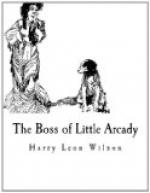It seems to me now that these bows were like the touch of frosted woodbine in a yellowing elm, though at the moment I must have been unequal to this fancy. I saw, too, the tiny chain that clasped her fair throat, her dress of pale blue, and, most wonderful of all, two tassels that danced from the tops of her trim little boots. The air was indeed too heavy with beauty. But the reading lesson continued.
The years that stretch between that time and this have not bereaved me of the knowledge that Mr. Barton graciously accommodated Hiram Strosser, after vainly seeking to induce “Mr. Hawley, a wealthy merchant of Milk Street,” to share half the risk.
At this point a row of stars on the page indicated a lapse of ten years. Mr. Barton, “pale and agitated,” examines with deepening despair, “page after page of his ponderous ledger.” At last he exclaims, “I am ruined, utterly ruined!” “How so?” inquires Hiram Strosser, who enters the room just in time to hear the cry. Mr. Barton explains,—the failure of Perleg, Jackson & Co. of London—news brought on last steamer—creditors pressing him.
“‘What amount would tide you over this crisis?’ asks Hiram Strosser, respectfully.
“‘Seventy-five thousand dollars!’
“‘Then, sir, you shall have it,’ replied Hiram, and stepping to the desk he drew a check for the full amount.”
Nor can I ever forget the stroke of poetic justice with which the anecdote concluded. Mr. Hawley of Milk Street was also embarrassed by the failure of Perleg, Jackson & Co., but, for want of a trustful friend in funds, was thrown into bankruptcy. Mr. Barton had the chastened pleasure of telling Mr. Hawley about Hiram’s loan, and of reminding him that he had neglected a fair opportunity to become a co-benefactor of that upright and open-handed youth; whereupon the ruined Hawley—deservedly ruined, the tale implied—“moved on, dejected and sad, while Mr. Barton returned to his establishment cheered and animated.”
The gross, the immoral romanticism of this tale was not then, of course, apparent to me. Children are so defenceless! Child that I was, I believed it would be entirely practicable for a lad in his teens to borrow two thousand dollars from a Boston merchant, by reminding him that the boy is not the man. So readily is the young mind poisoned. During the latter part of the lesson, between looks stolen fearfully at her profile, I was mentally engaged in borrowing two thousand dollars from a convenient Mr. Barton with which to establish myself in a small retail business—preferably a candy store with an ice-cream parlor in the rear. Then I took her to wife, not forgetting to reward Mr. Barton handsomely in the day of his ruin. Dimly, in the background of this hasty dramatization, the distrustful Mr. Hawley, who refused to share the loan with Mr. Barton, figured as a rival for my love’s hand; and lived to hear her say that she hated, loathed, and despised him.




